formerly eScholarship Editions


|
|
|
|
Browse by Author
All Titles | Public Titles
A | B | C | D | E | F | G | H | I | J | K | L | M | N | O | P | Q | R | S | T | U | V | W | Y | Z | OTHERYour request for authors beginning with F found 86 book(s). | Modify Search | Displaying 1 - 20 of 86 book(s) | |
| 1. | 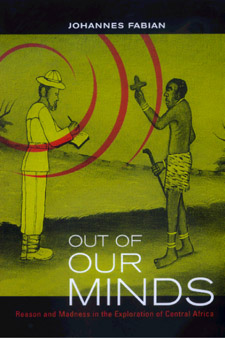 | Title: Out of our minds: reason and madness in the exploration of Central Africa: the Ad. E. Jensen lectures at the Frobenius Institut, University of Frankfurt Author: Fabian, Johannes Published: University of California Press, 2000 Subjects: Anthropology | African History | Cultural Anthropology Publisher's Description: Explorers and ethnographers in Africa during the period of colonial expansion are usually assumed to have been guided by rational aims such as the desire for scientific knowledge, fame, or financial gain. This book, the culmination of many years of research on nineteenth-century exploration in Central Africa, provides a new view of those early European explorers and their encounters with Africans. Out of Our Minds shows explorers were far from rational--often meeting their hosts in extraordinary states influenced by opiates, alcohol, sex, fever, fatigue, and violence. Johannes Fabian presents fascinating and little-known source material, and points to its implications for our understanding of the beginnings of modern colonization. At the same time, he makes an important contribution to current debates about the intellectual origins and nature of anthropological inquiry. Drawing on travel accounts--most of them Belgian and German--published between 1878 and the start of World War I, Fabian describes encounters between European travelers and the Africans they met. He argues that the loss of control experienced by these early travelers actually served to enhance cross-cultural understanding, allowing the foreigners to make sense of strange facts and customs. Fabian's provocative findings contribute to a critique of narrowly scientific or rationalistic visions of ethnography, illuminating the relationship between travel and intercultural understanding, as well as between imperialism and ethnographic knowledge. [brief] Similar Items |
| 2. |  | Title: The unvarnished truth: personal narratives in nineteenth-century America Author: Fabian, Ann Published: University of California Press, 2000 Subjects: American Studies | United States History | American Literature Publisher's Description: The practice of selling one's tale of woe to make a buck has long been a part of American culture. The Unvarnished Truth: Personal Narratives in Nineteenth-Century America is a powerful cultural history of how ordinary Americans crafted and sold their stories of hardship and calamity during the nineteenth century. Ann Fabian examines the tales of beggars, convicts, ex-slaves, prisoners of the Confederacy, and others to explore cultural authority, truth-telling, and the nature of print media as the country was shifting to a market economy. This well-crafted book describes the fascinating controversies surrounding these little-read tales and returns them to the social worlds where they were produced.Drawing on an enormous number of personal narratives - accounts of mostly poor, suffering, and often uneducated Americans - The Unvarnished Truth analyzes a long-ignored tradition in popular literature. Historians have treated the spread of literacy and the growth of print culture as a chapter in the democratization of refinement, but these tales suggest that this was not always the case. Producing stories that purported to be the plain, unvarnished truth, poor men and women edged their way onto the cultural stage, using storytelling strategies far older than those relying on a Renaissance sense of refinement and polish. This book introduces a unique collection of tales to explore the nature of truth, authenticity, and representation. [brief] Similar Items |
| 3. | 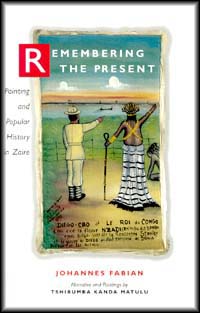 | Title: Remembering the present: painting and popular history in Zaire Author: Fabian, Johannes Published: University of California Press, 1996 Subjects: Anthropology | Cultural Anthropology | Art | African History | Politics | African Studies Publisher's Description: This book combines ethnography with the study of art to present a fascinating new vision of African history. It contains the paintings of a single artist depicting Zaire's history, along with a series of ethnographic essays discussing local history, its complex relationship to forms of self-expression and self-understanding, and the aesthetics of contemporary urban African and Third World societies. As a collaboration between ethnographer and painter, this innovative study challenges text-oriented approaches to understanding history and argues instead for an event- and experience-oriented model, ultimately adding a fresh perspective to the discourse on the relationship between modernity and tradition.During the 1970s, Johannes Fabian encouraged Tshibumba Kanda Matulu to paint the history of Zaire. The artist delivered the work in batches, together with an oral narrative. Fabian recorded these statements along with his own question-and-answer sessions with the painter. The first part of the book is the complete series of 100 paintings, with excerpts from the artist's narrative and the artist-anthropologist dialogues. Part Two consists of Fabian's essays about this and other popular painting in Zaire. The essays discuss such topics as performance, orality, history, colonization, and popular art. [brief] Similar Items |
| 4. |  | Title: Language and colonial power: the appropriation of Swahili in the former Belgian Congo, 1880-1938 Author: Fabian, Johannes Published: University of California Press, 1991 Subjects: Postcolonial Studies | Cultural Anthropology | Language and Linguistics | African History | African Studies Similar Items |
| 5. |  | Title: Evolution of sickness and healing Author: Fabrega, Horacio Published: University of California Press, 1997 Subjects: Medicine | Medical Anthropology Publisher's Description: Evolution of Sickness and Healing is a theoretical work on the grand scale, an original synthesis of many disciplines in social studies of medicine. Looking at human sickness and healing through the lens of evolutionary theory, Horacio Fàbrega, Jr. presents not only the vulnerability to disease and injury but also the need to show and communicate sickness and to seek and provide healing as innate biological traits grounded in evolution. This linking of sickness and healing, as inseparable facets of a unique human adaptation developed during the evolution of the hominid line, offers a new vantage point from which to examine the institution of medicine.To show how this complex, integrated adaptation for sickness and healing lies at the root of medicine, and how it is expressed culturally in relation to the changing historical contingencies of human societies, Fàbrega traces the characteristics of sickness and healing through the early and later stages of social evolution. Besides offering a new conceptual structure and a methodology for analyzing medicine in evolutionary terms, he shows the relevance of this approach and its implications for the social sciences and for medical policy. Health scientists and medical practitioners, along with medical historians, economists, anthropologists, and sociologists, now have the opportunity to consider every essential aspect of medicine within an integrated framework. [brief] Similar Items |
| 6. |  | Title: Nationalism and the Nordic imagination: Swedish art of the 1890s Author: Facos, Michelle Published: University of California Press, 1998 Subjects: Art | Art History | European Studies Publisher's Description: This richly illustrated book is a lucid introduction to a largely neglected manifestation of Modernism that came out of fin-de-siècle Sweden. Michelle Facos presents the first study in English to seriously examine the movement known as Swedish National Romanticism. Her work is especially valuable in showing how the movement's primitivist tendencies were related to, but different from, similar cultural forces in Germany and other parts of Europe at that time. Facos shows how a small group of Swedish artists espoused a politically progressive, culturally conservative form of nationalism. These artists - among them Carl Larsson, Bruno Liljefors, and Hanna Hirsch Pauli - produced a specifically national Swedish art by focusing on indigenous history, legends, and folk tales as well as uniquely Swedish-Nordic values, geography, and ethnography. Their breathtaking images of the Nordic landscape shaped a communal "Folk" identity that accented regionalism, solidarity, and attachment to the past and protested against the perceived dangers of capitalist industrialism and urban expansion. By 1900 Sweden was on its way to realizing a society of social, economic, and political equality, and the National Romantic painters were no longer renegades. Facos's portrayal of their movement will attract readers in the arts, historians, folklorists, cultural anthropologists, and sociologists. [brief] Similar Items |
| 7. |  | Title: When we began there were witchmen: an oral history from Mount Kenya Author: Fadiman, Jeffrey Published: University of California Press, 1994 Subjects: History | Anthropology | African Studies | African History Publisher's Description: This is the history of the Meru people of Mount Kenya, based on their own traditions, from the earliest times through the colonial period. Many of these tales have been ritually passed down through no fewer than nineteen generations; others were remembered by those personally involved. Jeffrey Fadiman gathered them in interviews with more than 100 of the Meru's oldest men and women.The traditions touch on every era of the Meru past. They include narrations, songs, chants, and riddles. They tell of a mysterious origin, past enslavement, despairing flight, mountain warriorhood, British conquest, and the fight for freedom. The Meru elders spoke most often of urogi, or witchcraft, the incantations, rituals, and potions used to deal with the supernatural aspects of Meru life. As their society evolved, so did their urogi , developing a history of its own as practitioners in every generation sought to cope with the challenges of slavery, migration, war, colonialism, and Christianity.Fadiman has crafted the tales into a compelling narrative, passing on in his turn the stories he was given. This is African history from African perspectives that stretch back over 300 years. [brief] Similar Items |
| 8. | 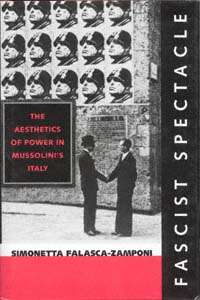 | Title: Fascist spectacle: the aesthetics of power in Mussolini's Italy Author: Falasca-Zamponi, Simonetta 1957- Published: University of California Press, 1997 Subjects: History | European History | Popular Culture | European Studies | Politics Publisher's Description: This richly textured cultural history of Italian fascism traces the narrative path that accompanied the making of the regime and the construction of Mussolini's power. Simonetta Falasca-Zamponi reads fascist myths, rituals, images, and speeches as texts that tell the story of fascism. Linking Mussolini's elaboration of a new ruling style to the shaping of the regime's identity, she finds that in searching for symbolic means and forms that would represent its political novelty, fascism in fact brought itself into being, creating its own power and history.Falasca-Zamponi argues that an aesthetically founded notion of politics guided fascist power's historical unfolding and determined the fascist regime's violent understanding of social relations, its desensitized and dehumanized claims to creation, its privileging of form over ethical norms, and ultimately its truly totalitarian nature. [brief] Similar Items |
| 9. | 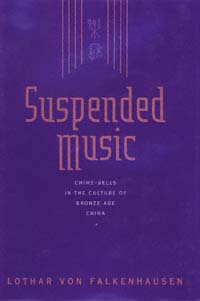 | Title: Suspended music: chime-bells in the culture of Bronze Age China Author: Falkenhausen, Lothar von Published: University of California Press, 1994 Subjects: History | Music | Asian History | China | Art History Publisher's Description: The Chinese made the world's first bronze chime-bells, which they used to perform ritual music, particularly during the Shang and Zhou dynasties (ca. 1700-221 B.C.). Lothar von Falkenhausen's rich and detailed study reconstructs how the music of these bells - the only Bronze Age instruments that can still be played - may have sounded and how it was conceptualized in theoretical terms. His analysis and discussion of the ritual, political, and technical aspects of this music provide a unique window into ancient Chinese culture.This is the first interdisciplinary perspective on recent archaeological finds that have transformed our understanding of ancient Chinese music. Of great significance to the understanding of Chinese culture in its crucial formative stage, it provides a fresh point of departure for exploring later Asian musical history and offers great possibilities for comparisons with music worldwide. [brief] Similar Items |
| 10. | 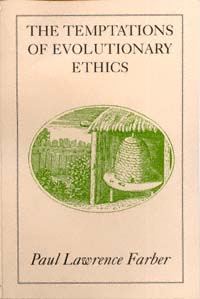 | Title: The temptations of evolutionary ethics Author: Farber, Paul Lawrence 1944- Published: University of California Press, 1994 Subjects: Philosophy | History | Ethics | History and Philosophy of Science Publisher's Description: Evolutionary theory tells us about our biological past; can it also guide us to a moral future? Paul Farber's compelling book describes a century-old philosophical hope held by many biologists, anthropologists, psychologists, and social thinkers: that universal ethical and social imperatives are built into human nature and can be discovered through knowledge of evolutionary theory.Farber describes three upsurges of enthusiasm for evolutionary ethics. The first came in the early years of mid-nineteenth century evolutionary theories; the second in the 1920s and '30s, in the years after the cultural catastrophe of World War I; and the third arrived with the recent grand claims of sociobiology to offer a sound biological basis for a theory of human culture.Unlike many who have written on evolutionary ethics, Farber considers the responses made by philosophers over the years. He maintains that their devastating criticisms have been forgotten - thus the history of evolutionary ethics is essentially one of oft-repeated philosophical mistakes.Historians, scientists, social scientists, and anyone concerned about the elusive basis of selflessness, altruism, and morality will welcome Farber's enlightening book. [brief] Similar Items |
| 11. | 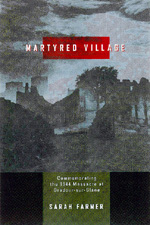 | Title: Martyred village: commemorating the 1944 massacre at Oradour-sur-Glane Author: Farmer, Sarah Bennett Published: University of California Press, 1999 Subjects: History | French Studies | European History Publisher's Description: Among German crimes of the Second World War, the Nazi massacre of 642 men, women, and children at Oradour-sur-Glane on June 10, 1944, is one of the most notorious. On that Saturday afternoon, four days after the Allied landings in Normandy, SS troops encircled the town in the rolling farm country of the Limousin. Soldiers marched the men to nearby barns, lined them up, and shot them. They then locked the women and children in the church, shot them, and set the building and the rest of the town on fire. Residents who had been away for the day returned to a blackened scene of horror, carnage, and devastation.In 1946 the French State expropriated and preserved the entire ruins of Oradour. The forty acres of crumbling houses, farms and shops became France's village martyr , set up as a monument to French suffering under the German occupation. Today, the village is a tourist destination, complete with maps and guidebooks.In this first full-scale study of the destruction of Oradour and its remembrance over the half century since the war, Sarah Farmer investigates the prominence of the massacre in French understanding of the national experience under German domination. Through interviews with survivors and village officials, as well as extensive archival research, she pieces together a fascinating history of both a shattering event and its memorial afterlife.Complemented by haunting photographs of the site, Farmer's eloquent dissection of France's national memory addresses the personal and private ways in which, through remembrance, people try to come to terms with enormous loss. Martyred Village will have implications for the study of the history and sociology of memory, testimonies about remembrances of war and the Holocaust, and postmodern concerns with the presentation of the past. [brief] Similar Items |
| 12. |  | Title: AIDS: the making of a chronic disease Author: Fee, Elizabeth Published: University of California Press, 1991 Subjects: History | Medicine | United States History | Sociology Publisher's Description: When AIDS was first recognized in 1981, most experts believed that it was a plague, a virulent unexpected disease. They thought AIDS, as a plague, would resemble the great epidemics of the past: it would be devastating but would soon subside, perhaps never to return. By the middle 1980s, however, it became increasingly clear that AIDS was a chronic infection, not a classic plague.In this follow-up to AIDS: The Burdens of History , editors Elizabeth Fee and Daniel M. Fox present essays that describe how AIDS has come to be regarded as a chronic disease. Representing diverse fields and professions, the twenty-three contributors to this work use historical methods to analyze politics and public policy, human rights issues, and the changing populations with HIV infection. They examine the federal government's testing of drugs for cancer and HIV, and show how the policy makers' choice of a specific historical model (chronic disease versus plague) affected their decisions. A powerful photo essay reveals the strengths of women from various backgrounds and lifestyles who are coping with HIV. A sensitive account of the complex relationships of the gay community to AIDS is included. Finally, several contributors provide a sampling of international perspectives on the impact of AIDS in other nations. [brief] Similar Items |
| 13. |  | Title: AIDS: the burdens of history Author: Fee, Elizabeth Published: University of California Press, 1988 Subjects: Medicine | Science Publisher's Description: The AIDS epidemic has posed more urgent historical questions than any other disease of modern times. How have societies responded to epidemics in the past? Why did the disease emerge when and where it did? How has it spread among members of particular groups? And how will the past affect the future - in particular, what does the history of medical science and public health tell us about our ability to control the epidemic and eventually to cure the disease?Historical methods of inquiry change, and people who use these methods often disagree on theory and practice. Indeed, the contributors to this volume hold a variety of opinions on controversial historiographic issues. But they share three important principles: cautious adherence to the "social constructionist" view of past and present; profound skepticism about historicism's idea of progress; and wariness about "presentism," the distortion of the past by seeing it only from the point of view of the present.Each of the twelve essays addresses an aspect of the burdens of history during the AIDS epidemic. By "burdens" is meant the inescapable significance of events in the past for the present. All of these events are related in some way to the current epidemic and can help clarify the complex social and cultural responses to the crisis of AIDS.This collection illuminates present concerns directly and forcefully without sacrificing attention to historical detail and to the differences between past and present situations. It reminds us that many of the issues now being debated - quarantine, exclusion, public needs and private rights - have their parallels in the past. This will be an important book for social historians and general readers as well as for historians of medicine. [brief] Similar Items |
| 14. | 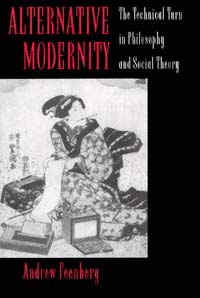 | Title: Alternative modernity: the technical turn in philosophy and social theory Author: Feenberg, Andrew Published: University of California Press, 1995 Subjects: Philosophy | Social and Political Thought | History and Philosophy of Science | Popular Culture Publisher's Description: In this new collection of essays, Andrew Feenberg argues that conflicts over the design and organization of the technical systems that structure our society shape deep choices for the future. A pioneer in the philosophy of technology, Feenberg demonstrates the continuing vitality of the critical theory of the Frankfurt School. He calls into question the anti-technological stance commonly associated with its theoretical legacy and argues that technology contains potentialities that could be developed as the basis for an alternative form of modern society.Feenberg's critical reflections on the ideas of Jürgen Habermas, Herbert Marcuse, Jean-François Lyotard, and Kitaro Nishida shed new light on the philosophical study of technology and modernity. He contests the prevalent conception of technology as an unstoppable force responsive only to its own internal dynamic and politicizes the discussion of its social and cultural construction.This argument is substantiated in a series of compelling and well-grounded case studies. Through his exploration of science fiction and film, AIDS research, the French experience with the "information superhighway," and the Japanese reception of Western values, he demonstrates how technology, when subjected to public pressure and debate, can incorporate ethical and aesthetic values. [brief] Similar Items |
| 15. | 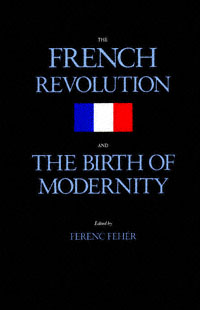 | Title: The French Revolution and the birth of modernity Author: Fehér, Ferenc 1933- Published: University of California Press, 1990 Subjects: History | Politics | Social Theory Publisher's Description: Written from widely different perspectives, these essays characterize the Great Revolution as the dawn of the modern age, the grand narrative of modernity. The scope of issues under scrutiny is extremely broad, ranging from the analyses of the hotly debated class character of 1789 and the problem of . . . [more] Similar Items |
| 16. | 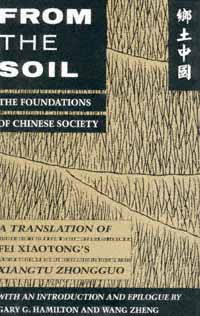 | Title: From the soil, the foundations of Chinese society: a translation of Fei Xiaotong's Xiangtu Zhongguo ; with an introduction and epilogue by Gary G. Hamilton and Wang Zheng Author: Fei, Xiaotong Published: University of California Press, 1992 Subjects: Sociology | China | Asian History Publisher's Description: This classic text by Fei Xiaotong, China's finest social scientist, was first published in 1947 and is Fei's chief theoretical statement about the distinctive characteristics of Chinese society. Written in Chinese from a Chinese point of view for a Chinese audience, From the Soil describes the contrasting organizational principles of Chinese and Western societies, thereby conveying the essential features of both. Fei shows how these unique features reflect and are reflected in the moral and ethical characters of people in these societies. This profound, challenging book is both succinct and accessible. In its first complete English-language edition, it is likely to have a wide impact on Western social theorists.Gary G. Hamilton and Wang Zheng's translation captures Fei's jargonless, straightforward style of writing. Their introduction describes Fei's education and career as a sociologist, the fate of his writings on and off the Mainland, and the sociological significance of his analysis. The translators' epilogue highlights the social reforms for China that Fei drew from his analysis and advocated in a companion text written in the same period. [brief] Similar Items |
| 17. |  | Title: Healing the masses: Cuban health politics at home and abroad Author: Feinsilver, Julie Margot Published: University of California Press, 1993 Subjects: Latin American Studies | Politics | Medicine | Public Policy Publisher's Description: How has Cuba, a small, developing country, achieved its stunning medical breakthroughs? Hampered by scarce resources and a long-standing U.S. embargo, Cuba nevertheless has managed to provide universal access to health care, comprehensive health education, and advanced technology, even amid desperate economic conditions. Moreover, Cuba has sent disaster relief, donations of medical supplies and technology, and cadres of volunteer doctors throughout the world, emerging, in Castro's phrase, as a "world medical power."In her significant and timely study, Julie Feinsilver explores the Cuban medical phenomenon, examining how a governmental obsession with health has reaped medical and political benefits at home and abroad. As a result of Cuba's forward strides in health care, infant mortality rates are low even by First World standards. Cuba has successfully dealt with the AIDS epidemic in a manner that has aroused controversy and that some claim has infringed on individual liberties - issues that Feinsilver succinctly evaluates.Feinsilver's research and travel in Cuba over many years give her a unique perspective on the challenges Cuba faces in this time of unprecedented economic and political uncertainty. Her book is a must-read for everyone concerned with health policy, international relations, and Third World societies. [brief] Similar Items |
| 18. | 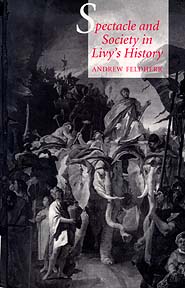 | Title: Spectacle and society in Livy's history Author: Feldherr, Andrew 1963- Published: University of California Press, 1998 Subjects: Classics | Classical Literature and Language | Classical History | Comparative Literature | Literature Publisher's Description: Public spectacle - from the morning rituals of the Roman noble to triumphs and the shows of the Arena - formed a crucial component of the language of power in ancient Rome. The historian Livy (c. 60 B.C.E.-17 C.E.), who provides our fullest description of Rome's early history, presents his account of the growth of the Roman state itself as something to be seen - a visual monument and public spectacle. Through analysis of several episodes in Livy's History , Andrew Feldherr demonstrates the ways in which Livy uses specific visual imagery to make the reader not only an observer of certain key events in Roman history but also a participant in those events. This innovative study incorporates recent literary and cultural theory with detailed historical analysis to put an ancient text into dialogue with contemporary discussions of visual culture.In Spectacle and Society in Livy's History , Feldherr shows how Livy uses the literary representation of spectacles from the Roman past to construct a new sense of civic identity among his readers. He offers a new way of understanding how Livy's technique addressed the political and cultural needs of Roman citizens in Livy's day. In addition to renewing our understanding of Livy through modern scholarship, Feldherr provides a new assessment of the historian's aims and methods by asking what it means for the historian to make readers spectators of history. [brief] Similar Items |
| 19. | 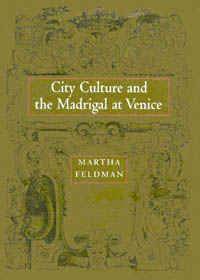 | Title: City culture and the madrigal at Venice Author: Feldman, Martha Published: University of California Press, 1995 Subjects: Music | Musicology | European History Publisher's Description: Martha Feldman's exploration of sixteenth-century Venetian madrigals centers on the importance to the Venetians of Ciceronian rhetorical norms, which emphasized decorum through adherence to distinct stylistic levels. She shows that Venice easily adapted these norms to its long-standing mythologies of equilibrium, justice, peace, and good judgment. Feldman explains how Venetian literary theorists conceived variety as a device for tempering linguistic extremes and thereby maintaining moderation. She further shows how the complexity of sacred polyphony was adapted by Venetian music theorists and composers to achieve similar ends.At the same time, Feldman unsettles the kinds of simplistic alignments between the collectivity of the state and its artistic production that have marked many historical studies of the arts. Her rich social history enables a more intricate dialectics among sociopolitical formations; the roles of individual printers, academists, merchants, and others; and the works of composers and poets. City Culture offers a new model for situating aesthetic products in a specific time and place, one that sees expressive objects not simply against a cultural backdrop but within an integrated complex of cultural forms and discursive practices. [brief] Similar Items |
| 20. | 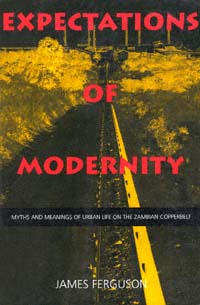 | Title: Expectations of modernity: myths and meanings of urban life on the Zambian Copperbelt Author: Ferguson, James 1959- Published: University of California Press, 1999 Subjects: Anthropology | African Studies | Cultural Anthropology | African History | Postcolonial Studies | Social Problems Publisher's Description: Once lauded as the wave of the African future, Zambia's economic boom in the 1960s and early 1970s was fueled by the export of copper and other primary materials. Since the mid-1970s, however, the urban economy has rapidly deteriorated, leaving workers scrambling to get by. Expectations of Modernity explores the social and cultural responses to this prolonged period of sharp economic decline. Focusing on the experiences of mineworkers in the Copperbelt region, James Ferguson traces the failure of standard narratives of urbanization and social change to make sense of the Copperbelt's recent history. He instead develops alternative analytic tools appropriate for an "ethnography of decline."Ferguson shows how the Zambian copper workers understand their own experience of social, cultural, and economic "advance" and "decline." Ferguson's ethnographic study transports us into their lives - the dynamics of their relations with family and friends, as well as copper companies and government agencies.Theoretically sophisticated and vividly written, Expectations of Modernity will appeal not only to those interested in Africa today, but to anyone contemplating the illusory successes of today's globalizing economy. [brief] Similar Items |